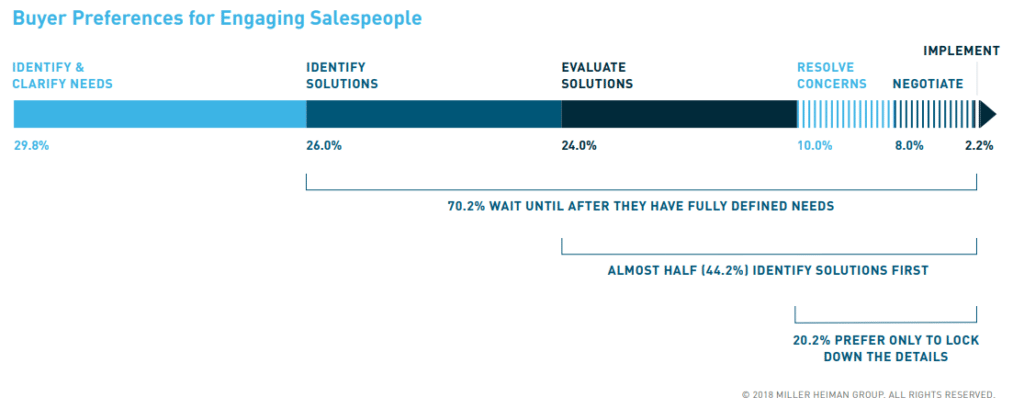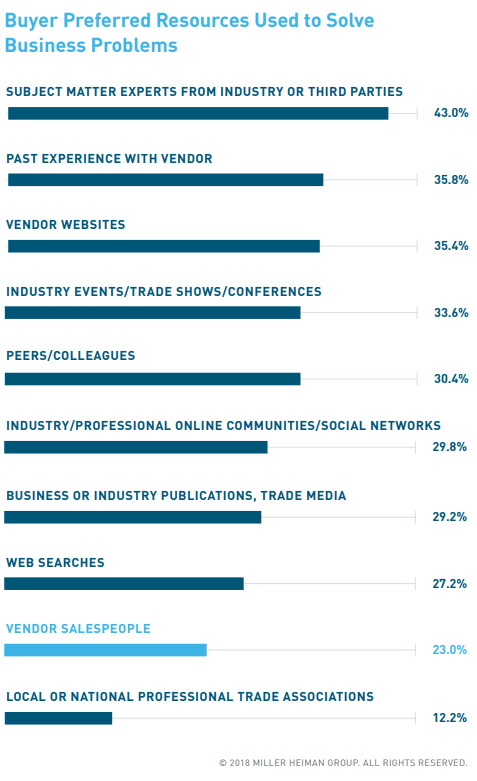What’s the secret to more sales conversions?
It’s relationships.
Researchers at Korn Ferry found that customer relationships and sales processes are the primary contributors to sales success. The stronger your customer relationships and sales processes, the easier it is to win more deals.
That’s probably not a surprise.
That’s the problem; most seasoned salespeople know that customer relationships are essential. What we’re not told is how we go about building those relationships with customers without becoming a pest. This is a key point because, let’s face it, customers treat most salespeople like pests.
Why you won’t survive without sales outreach
Remember the research point I shared in part one of our sales outreach series?
It was pretty shocking.
At any given time, only 3% of your prospects are active buyers. These prospects are actively shopping for the products or services your company provides. They’re looking to make a purchase in 1-3 months; these prospects are sales-ready. That means these prospects have the ability and willingness to buy.
It gets worse.
So 97% of prospects aren’t ready to buy; 60% of prospects aren’t willing to buy, and half of those aren’t willing to buy from you. Ever.
This means it’s not a numbers game. You’re not going to win more deals by spamming the market. If you want to develop a reputation for winning, you’ll need to help your prospects win as well. This means sales outreach is a targeting and matchmaking game.
Why hunting for sales fails to win deals
Sales hunters are aggressive go-getters.
These sales reps are completely unfazed by rejection, insults, or abuse. They’re hungry, driven by rewards, status, and incentives. They expect their sales efforts to make a direct impact on their income. In the past, the effect was noticeable; that’s no longer the case today.
This isn’t just my opinion.
According to Dr. Brian Brim, Gallup practice expert, executive adviser, and author of Strengths Based Selling. “Customers need to feel you connect and care about them as people, understand their needs, and will guide them to the right solution for them. And they want to know you’ll be there for them when they need you.”
High-pressure selling is on the decline.
How do we know?
Research from SCO Insights shows that almost 50% of prospects make up their mind before talking to sales reps. Just over 70% (70.2%) wait until after they’ve fully defined their needs.
See for yourself.

Successful salespeople today are farmers.
These salespeople plant seeds of value wherever and whenever they can. They nurture these seeds of value with additional education then, once they’ve created tremendous value, they make a relevant offer.
The data on this is clear as well.

But how?
What specifically do salespeople need to do to ‘plant seeds of value?’
It’s simple.
You start with Peter Thiel’s value formula as a guide.
- Create X dollars of value
- Capture Y percent of X
It’s a simple, two-step process you can use to build strong relationships with the prospects in your sales pipeline. Remember, the world revolves around value creation. It’s an unexpected strategy because most salespeople do not create value for their prospects; those that do, do so during the sales process.
It’s rare to find a sales rep who creates value before, during, and after the sale. This is what I mean when I talk about farming.
Creating sales outreach strategies that create value
Who do you want to be?
In The Tipping Point, Malcolm Gladwell points out several types of people with rare and unique social gifts.
- Connectors: These salespeople are social butterflies; they know anyone and everyone in the industry. They have this wonderful habit of connecting with people and making introductions up and down the status chain. Drop these superstars off in a new territory, and they’ll have hundreds of new friends by the night’s end.
- Mavens: These salespeople are information brokers who collect, harvest, curate, and share new information. They’re “pathologically helpful,” using their incredibly deep reservoir of knowledge to solve other people’s problems, usually by solving their own.
- Salespeople: These are charismatic persuaders with a knack for negotiation. They’re able to rally people to their cause, funnel support towards a charitable organization, or inception people with their ideas. They’re adept at getting others to agree with and believe in them. They’re highly skilled at gaining access to difficult-to-reach people or places.
Do you know why these skills are so valuable for your sales outreach strategies?
No? I’ll tell you.
These skills are extremely difficult to find in the general population. Most people simply don’t want to do the work needed to develop these skills. If you take the time to develop these skills, you’ll find that your sales outreach strategies generate significantly more value (deals won, revenue, commissions, etc.) than co-workers without these skills.
What else do you need?
You’ll need a network. If you want to create value, you’ll need a network of people around you. This network is essential for several reasons:
- You’re competition-proof: If you have a network that provides your prospects with value, your competitors (other salespeople) inside and outside your company won’t be able to keep up with you. You’ll be able to create powerful relationships with customers automatically.
- It creates strong loyalty: Your customers won’t be able to get what you provide. If you take the time to develop this kind of value for your customers, they can’t afford to leave. At this point, doing business with you is a no-brainer.
- Price immunity: If the prospects in your network know that you care about them and you’re obsessed with delivering value, they’ll be far more willing to pay what you ask, provided that your offerings are relevant to them.
How do you build this network?
You start with the 5+50+100 rule .
The 5+50+100 rule was created by Judy Robinett, a shy social worker from a small town in Idaho. Today she’s a bestselling author, entrepreneur, and venture capitalist. She’s received awards from presidents and consults with Fortune 500 companies. Robinett is known as the woman with the “titanium digital Rolodex.”
Here’s how it works in a nutshell.
You create a list of people and sort them into three distinct groups.
- Top 5: These are the five people you’re closest to and speak to daily. They’re the ones you’ll take a call from at any time. You’ll drop what you’re doing and rush to their side when they need help.
- Your Key 50: These people are an important part of your life. You speak to them weekly. These are your friends and close associates who add value and meaning to your life.
- Your Vital 100: These are casual friends and business acquaintances you contact at least once a month. Like your Key 50 and your Top 5, you can’t afford to lose these people, but you don’t have the time to follow up with them daily or even weekly.
Got your group? Good.
Pick five people at a time and get to know them. Use the process of humble inquiry to identify what’s important to them, what they want/need, who or what they’re looking for, and what they’re working on.
- Does your prospect need a lawyer? Arrange an introduction or lunch with that Power Lawyer you’re connected to.
- Is your prospect looking for a fast (but fair) exit from their business? Connect them with the business broker in your network.
- Your prospect’s daughters are headed off to college in another state, and someone in your network has vacation property they’re looking to offload or rent for the semester.
See what I mean?
The value you create can be personal or professional; it can be simple or complex. The point is it’s something that’s meaningful to your prospects.
Make sense?
Now, how do you use this network to create value?
Strategy #01: Kingmaker
This strategy works well for B2B decision makers.
Here’s how it works.
- Choose your target audience.
- Figure out what your target audience wants
- Find the person who can give it to them
- Make the connection between your prospect and their goal
For example, let’s say your B2B prospect is interested in scoring an interview with Entrepreneur on Fire, one of the biggest entrepreneur podcasts online. He wants to talk about accounting for his new SaaS startup and pitch an irresistible offer to their listeners.
As it turns out, you’re business acquaintances with the owner, John Lee Dumas.
You put your prospect in touch with Dumas; his interview is a huge success, and his startup scores several interviews with nationally syndicated shows. His SaaS company takes off, and he can eventually sell his startup for a profit.
Selling to this prospect will be easier moving forward.
Why?
You have connections you’re willing to use to add value to your prospect’s life. You used your resources to serve, and it paid off big.
What do you give to be a Kingmaker?
- Connections to power brokers, influencers, thought leaders, etc.
- Interviews curated on their behalf
- Opportunities
- Unasked for sales leads
Strategy #02: Posterboy
Your prospect wants to sell more of their products and services. They know buying your product will make a big difference, but they’re scared. A cash flow crunch in their industry is common, and the pricing of your product is higher than they feel comfortable with.
Long story short, it’s a risk.
Here’s the good news; you’ve already taken a risk with your prospect. You’ve purchased their B2C accounting and budgeting product, you gave it a go, and it made a big difference in your life.
So you did the right thing.
You reached out to your prospect with the good news. You’re super excited, and you shared your story with them. They ask if you’d be willing to share a review.
Of course, you are.
You share your review on several review platforms, you reach out to specific people in your network, and you share your story. They’re excited, so they forward things to their network. All of a sudden, your story has gone viral. Your prospect is touched, you’re happy, and your friends in your network are delighted.
All this happened well before your prospect reached out to purchase your company’s product.
They’re feeling the pinch.
Your company’s product isn’t cheap, but they trust you. You’re their Poster Boy, and you’re looking out for them. Both of you are friends, and they’re willing to put their trust in you. It’s a sale only you can deliver, and you did it.
At full market value.
Strategy #03: Create Transformative Results
When it comes to results, there are two kinds. You need both to turbocharge your sales outreach efforts and win rates.
- Conventional results: Include being great at your job, going above and beyond, and performing well. If you’re a sales rep, you always meet quota; you’re knowledgeable about the products and services you sell. Your profit-per-salesperson ratios are high, etc.
- Transformative results: These are results that make things better for your company, the industry, or customers. It can be as simple as shared knowledge or as detailed as Kingmaker deals that land a big fish for your organization.
Using your network, you can create transformative results that make a significant impact.
Here are a few examples:
- Connecting leaders (e.g., executives, directors, managers, etc.) in your company with leaders in other companies
- Sharing detailed, secret, or hidden information with people in your organization
- Persuade prospects to accept deals that are more favorable to your company, provided that your company achieves the impossible
- Attracting high-value prospects via your personal email or marketing list
- Building a following of ideal customers via Facebook, LinkedIn, and Telegram groups
These difficult-to-replicate strategies put you in the top 1% of salespeople. They make it easy for you to attract whales, close seemingly impossible deals, and maintain a low customer attrition rate (e.g., have customers keep you on speed dial in case anything goes wrong).
Use these sales outreach strategies use to win deals
You know the secret to more sales conversions.
It’s relationships.
Customer relationships and sales processes are the primary contributors to sales success. The stronger your customer relationships and sales processes, the easier it is to win more deals.
It’s not a surprise.
Use these strategies to build strong customer relationships before, during, and after the sale. Use the strategies superstar rainmakers use to win deals; you’ll find your sales outreach efforts consistently close more deals.



